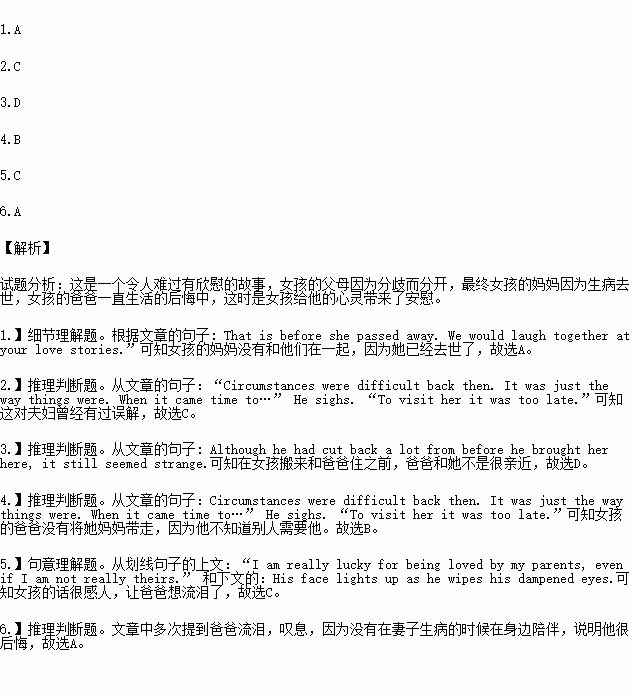题目内容
“Father, do you see Mother in your dreams?” the young girl asks. “You know sometimes I do.”
“Mother comes to see me a lot, you know. We sit and talk.” The father smiles. “How is your homework coming along?”
“Why do I have to study so hard?”
“It is what your mother would have wanted!”
She regrets speaking her mind. “I’m sorry, Father, I shouldn’t have said that.” She looks up and sees his eyes well up with tears.
“It’s okay, love,” he gets up and pours himself a drink. “I’ll just sit outside for a while. You finish up your work, okay?”
“I’m sorry, Father; Mother did love you very much. She told me all the time.”
“Homework, first, eh? Then we can chat about your mother.”
He heads off outside and sits in his usual chair, looking around the courtyard. The whole area relaxes the mind and somehow soothes the soul.
“All finished, Father. May I get a drink and sit with you? I have some questions.”
She comes with two drinks one for him and one for herself. He looks surprised. She never really liked him having a drink. Although he had cut back a lot from before he brought her here, it still seemed strange.
“Mother told me all about you. That is before she passed away. We would laugh together at your love stories.”
He listens without uttering a single sound.
“Why didn’t you come and take her away with you? She really wanted that. Did you know that?”
Her father looks at his daughter lovingly. “Circumstances were difficult back then. It was just the way things were. When it came time to…” He sighs. “To visit her it was too late.”
The girl smiles. “I hope I will have the same kind of love you and mother had.”
“Without all the heartache,” her father adds.
“She always knew you loved her. She told me every day,” the child mentions cheerfully. “I saw her crying sometimes when she read your letters.”
“Did she make you promise to look after me?” She inquires.
“She asked me to take care of you.”
“You promised her, didn’t you?”
“Yes, I did.”
“It is nice out here, isn't it? Mother would have been very happy here.”
She talks with some authority. Her father remains silent. A smile comes to his weary brow. He nods his head.
“Mother wanted me to give you something. I think now the time is right.” She runs to her room. Upon returning she hands her father a book. “It’s mother’s diary! She wanted me to give it to you.”
He takes the book and holds it in his trembling hands, “Thank you.”
“Mother said you would understand things better.”
“Wise woman, your mother.”
He places the book on the table as he gets up. The girl gets up and wraps herself around her father.
“I love you.” she looks up at his face.
He picks her up and hugs her. “I love you, too.” His voice trembles.
“It’s okay, Father. We have each other now and mother is in both of us.”
He kisses her head.
“Time you went to bed,” her father softly says.
He puts her down and she scampers off to get washed and ready for bed.
Clearing up everything he checks on his daughter. She is in bed waiting for her good night kiss. He tucks her in and bids her goodnight.
Just as he is to leave she tells him. “Mother told me she adopted me when I was a baby.”
He stands at her bedroom door. Words fail him. Yes, he knew she was adopted.
“I am really lucky for being loved by my parents, even if I am not really theirs.”
“You trying to bring on the water works?” he tells her.
She giggles, “Goodnight, Father. I love you.”
“Love you, too.”
His face lights up as he wipes his dampened eyes.
The door closes and the child falls asleep dreaming of her mother.
Sitting outside he picks up the diary and opens it and reads the first line: “I love you, my dearest, if only things could have been different…”
1.Why isn’t the mother with her family?
A. She has already died. B. She is ill in hospital.
C. The couple is divorced. D. She lives in another city.
2.What can we know about the couple’s relationship?
A. They understood each other very well.
B. They quarreled a lot and are separated.
C. They used to have misunderstandings.
D. They were quite sure of each other’s love.
3.What can we learn from the story?
A. The girl was adopted because the couple couldn’t give birth.
B. Father looks after the girl just because the girl is alone.
C. The girl feels unfortunate that she was adopted.
D. Father was not very close to the girl before she moved in with him.
4.Why didn’t father bring mother home when she was ill?
A. Because he was too busy with his work
B. Because he didn’t know he was wanted
C. Because he was too poor to afford the medical fees
D. Because he didn’t know she was in hospital
5.What does the sentence “You trying to bring on the water works?” mean?
A. You want another cup of water?
B. Are you kidding me?
C. Are you trying to make me cry?
D. Are you thinking about the water factory?
6.Which word best describes father’s feeling at the end of the story?
A. Regretful B. Satisfied
C. Confused D. Doubtful

